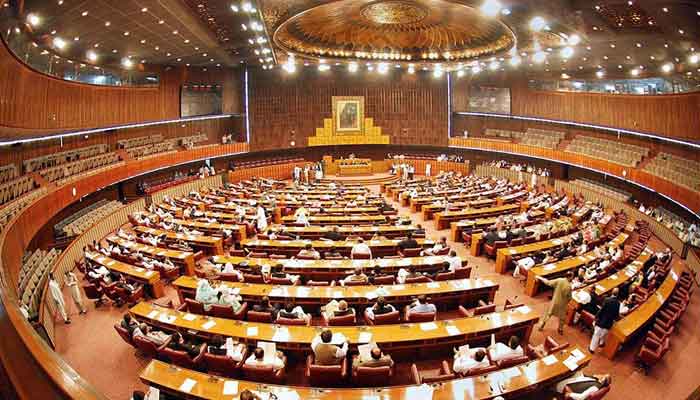NAO 1999 draft bill ready for parliament’s nod
The draft bill includes a provision to exclude private citizens holding no public office from the long arm of the National Accountability Bureau.
ISLAMABAD: The draft bill for amendments to the National Accountability Ordinance, 1999 aka the NAB (National Accountability Bureau) Law is ready on the table for Parliament’s approval.
The draft bill includes a provision to exclude private citizens holding no public office from the long arm of the National Accountability Bureau. "The application of NAB laws may not be extended in respect of a private person or entity, who, which is directly and indirectly unconnected with a holder of public office," reads the third proposed amendment to the law, media reports say.
The government’s decision to strip the NAB of powers to grill, investigate private citizens was announced by Federal Minister for Law and Justice Dr Farogh Nasim in a press conference on August 22. The draft proposes that the trial or accountability courts "may be conferred the power of entertaining and deciding pre-arrest and after-arrest bail applications".
Under the existing NAO of 1999, there is no provision for grant of bail to a NAB suspect. As a result, a suspect has to file a petition under Article 199 of the Constitution with the high court to seek bail. A citizen can invoke Article 199 and file a petition with the relevant high court to enforce fundamental rights when there is no remedy available under the law. The draft also proposes amendments pertaining to the voluntary return of an embezzled amount and release of a person under a plea bargain. As such, it suggests:
(i) The voluntary return may be approved by a committee formed by the prime minister. (ii) Guidelines to be formed for entertaining a request for voluntary returns and plea bargains. (iii) The acceptance of a plea bargain and voluntary return may see the public office holder disqualified to hold office or employment for a period of 10 years or any other period.
Furthermore, "a threshold of Rs500 million may be introduced," the draft suggests. Under the amended law, the valuation of immovable properties is to be reckoned either as per the District Collector rate or the Federal Board of Revenue (FBR) rate, whichever is higher.
The new NAB law will also take into consideration that lapses by officials do occur and will not categorise them as offences. "NAB shall not take cognizance of offences based on procedural lapses" unless there is evidence corroborating that the "officer has materially benefitted from such a decision or lapse", reads the proposed amendment. Referring to the section in the existing law pertaining to 'misuse of authority', the new law says the act will only be congnizable if there is an underlying criminal intent and the action results in an illegal or unjustifiable increase in the assets of a government servant. Furthermore, a government servant's assets will not be frozen solely on account of a belief that they have committed an offence. "The property shall be frozen once the officer has been convicted by the court," according to the draft amendment. The amended law will also see an accused being released on bail if an inquiry under the NAB ordinance is not concluded within a period of three months. Additionally, the previous 90-day physical custody period of an accused public office holder will be brought down to 45 days.
-
 Epstein Case: Ghislaine Maxwell Invokes Fifth, Refuses To Testify Before US Congress
Epstein Case: Ghislaine Maxwell Invokes Fifth, Refuses To Testify Before US Congress -
 Ferrari Luce: First Electric Sports Car Unveiled With Enzo V12 Revival
Ferrari Luce: First Electric Sports Car Unveiled With Enzo V12 Revival -
 Chappell Roan Parts Ways With Wasserman Music Over CEO's Ties With Epstein
Chappell Roan Parts Ways With Wasserman Music Over CEO's Ties With Epstein -
 Andrew Mountbatten Windsor Publically Shamed After Brother And Nephew Change Decades Old Royal Rule
Andrew Mountbatten Windsor Publically Shamed After Brother And Nephew Change Decades Old Royal Rule -
 Jon Stewart On Bad Bunny's Super Bowl Performance: 'Killed It''
Jon Stewart On Bad Bunny's Super Bowl Performance: 'Killed It'' -
 Savannah Guthrie Receives Massive Support From Reese Witherspoon, Jennifer Garner After Desperate Plea
Savannah Guthrie Receives Massive Support From Reese Witherspoon, Jennifer Garner After Desperate Plea -
 Celebrities Take Sides As Brooklyn Beckham’s Feud With David, Victoria Heats Up
Celebrities Take Sides As Brooklyn Beckham’s Feud With David, Victoria Heats Up -
 Prince Harry Reacts As Beatrice, Eugenie's Names Surface In Epstein Emails
Prince Harry Reacts As Beatrice, Eugenie's Names Surface In Epstein Emails -
 Cyprus Joins European AI Race: What It Means For Greek LLMs And Regional Innovation
Cyprus Joins European AI Race: What It Means For Greek LLMs And Regional Innovation -
 Amazon Soon To Launch 'AI Content' Marketplace, Says Report
Amazon Soon To Launch 'AI Content' Marketplace, Says Report -
 Is AI Reliable For Health Advice? New Study Raises Red Flags
Is AI Reliable For Health Advice? New Study Raises Red Flags -
 WhatsApp Web Starts Rolling Out Voice And Video Calling For Beta Users
WhatsApp Web Starts Rolling Out Voice And Video Calling For Beta Users -
 Catherine O’Hara’s Cause Of Death Finally Revealed
Catherine O’Hara’s Cause Of Death Finally Revealed -
 Swimmers Gather At Argentina’s Mar Chiquita For World Record Attempt
Swimmers Gather At Argentina’s Mar Chiquita For World Record Attempt -
 Brooklyn Beckham, Nicola New Move Could Leave David, Victoria Reeling
Brooklyn Beckham, Nicola New Move Could Leave David, Victoria Reeling -
 Anthropic Criticises ChatGPT Ads As OpenAI Begins Testing Advertising In AI Chats
Anthropic Criticises ChatGPT Ads As OpenAI Begins Testing Advertising In AI Chats




